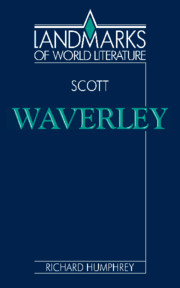4 - Waverley as initiator
Published online by Cambridge University Press: 27 January 2010
Summary
The novelty of Scott's historical novel
Which I was born to introduce …
Journal, 17 October 1826‘No-one ever begins.’ Alexis's remark, made in his obituary of Scott in 1832, is an appropriate caveat to this chapter. Of course, Waverley has its debts to predecessors, but do these debts mean that Scott's historical novel as form has no credit left, no novelty to call its own?
There are those who would limit or annul any suggestion of radical novelty in Waverley by placing it within one of two larger traditions. George Watson has described the historical novel as an ‘expanding form from Mme de Lafayette's La Princesse de Clèves (1678) to Scott's Waverley’ (156) – a tendency George Saintsbury had already taken to its logical conclusion with the remark, ‘Who wrote the first Historical Novel? The orthodox, and perhaps on the whole the sufficient, answer to this is, Xenophon.’ And similarly, other critics, including Lukács, have seen the historical novel as just another facet of the novel at large and not constituting a genre in its own right at all.
There is prima facie evidence both for and against such arguments. On the one hand, the term ‘historical novel’ is certainly older than Waverley and some forty years older than its earliest OED entry: it appears on the title pages of works of fiction (by Mrs E.M. Foster and anon.) as long before as 1795 and 1787, and by 1814 Mrs Byron and Jane West also had ‘historical novels’ to their names.
- Type
- Chapter
- Information
- Scott: Waverley , pp. 95 - 110Publisher: Cambridge University PressPrint publication year: 1993



